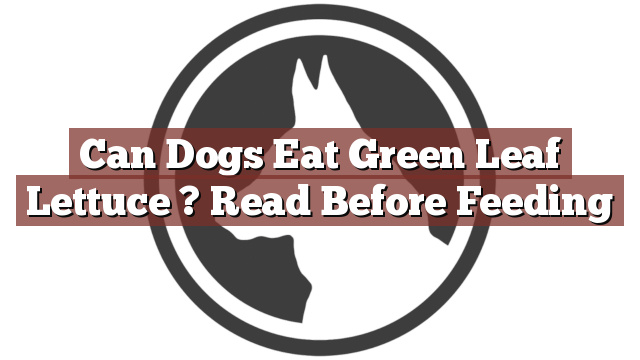Understanding Your Dog’s Dietary Needs
As responsible pet owners, it is crucial to understand our dogs’ dietary needs. While dogs primarily thrive on a diet of meat, it is not uncommon for them to show interest in other foods that we consume. However, not all human foods are safe for dogs, and some can even be toxic. It is essential to educate ourselves about what foods are suitable for our furry friends and what should be avoided.
Can Dogs Eat Green Leaf Lettuce? Read Before Feeding
Can dogs eat green leaf lettuce? The answer is yes, dogs can eat green leaf lettuce in moderation. Green leaf lettuce is low in calories and contains a variety of nutrients, such as vitamins A and K. Adding a small amount of green leaf lettuce to your dog’s diet can provide some health benefits. However, it is important to note that not all dogs enjoy the taste of lettuce, so it may not be appealing to every canine companion.
Before feeding green leaf lettuce to your dog, it is crucial to prepare it properly. Make sure to wash the lettuce thoroughly, removing any dirt or pesticides. It is also advisable to cut the lettuce into small, manageable pieces to prevent choking hazards. Always introduce new foods gradually into your dog’s diet, starting with small portions to test their tolerance and digestion.
Pros and Cons of Feeding Green Leaf Lettuce to Dogs
Feeding green leaf lettuce to dogs can have both advantages and disadvantages. Let’s take a closer look:
Pros:
- Nutrient-rich: Green leaf lettuce contains essential vitamins and minerals that can contribute to a well-balanced diet for your dog.
- Hydration: The high water content in lettuce can help keep your dog hydrated, especially during hot weather.
- Low in calories: If your dog needs to shed a few pounds, incorporating green leaf lettuce into their diet can be a healthy way to do so.
Cons:
- Digestive issues: Some dogs may experience digestive issues, such as diarrhea or gas, when consuming green leaf lettuce. Monitor your dog for any adverse reactions.
- Potential pesticides: Unless organic, lettuce can contain traces of pesticides, which may have harmful effects on your dog’s health. It is best to opt for organic lettuce or wash thoroughly before feeding.
Conclusion: Make Informed Choices for Your Dog’s Health
In conclusion, dogs can eat green leaf lettuce in moderation. While it can provide some health benefits, it is important to be aware of the potential risks and monitor your dog’s reaction. Always consult with your veterinarian before introducing any new foods to your dog’s diet, as they can provide personalized advice based on your dog’s specific needs and health conditions. Remember, a well-balanced diet, including appropriate amounts of protein, carbohydrates, and fats, is essential for your dog’s overall health and well-being.
Thank you for taking the time to read through our exploration of [page_title]. As every dog lover knows, our furry friends have unique dietary needs and responses, often varying from one canine to another. This is why it's paramount to approach any changes in their diet with caution and knowledge.
Before introducing any new treats or making alterations to your dog's diet based on our insights, it's crucial to consult with a veterinarian about [page_title]. Their expertise ensures that the choices you make are well-suited to your particular pet's health and well-being.
Even seemingly harmless foods can sometimes lead to allergic reactions or digestive issues, which is why monitoring your dog after introducing any new food item is essential.
The content provided here on [page_title] is crafted with care, thorough research, and a genuine love for dogs. Nevertheless, it serves as a general guideline and should not be considered a substitute for professional veterinary advice.
Always prioritize the expert insights of your veterinarian, and remember that the health and happiness of your furry companion come first.
May your journey with your pet continue to be filled with joy, love, and safe culinary adventures. Happy reading, and even happier snacking for your canine friend!

